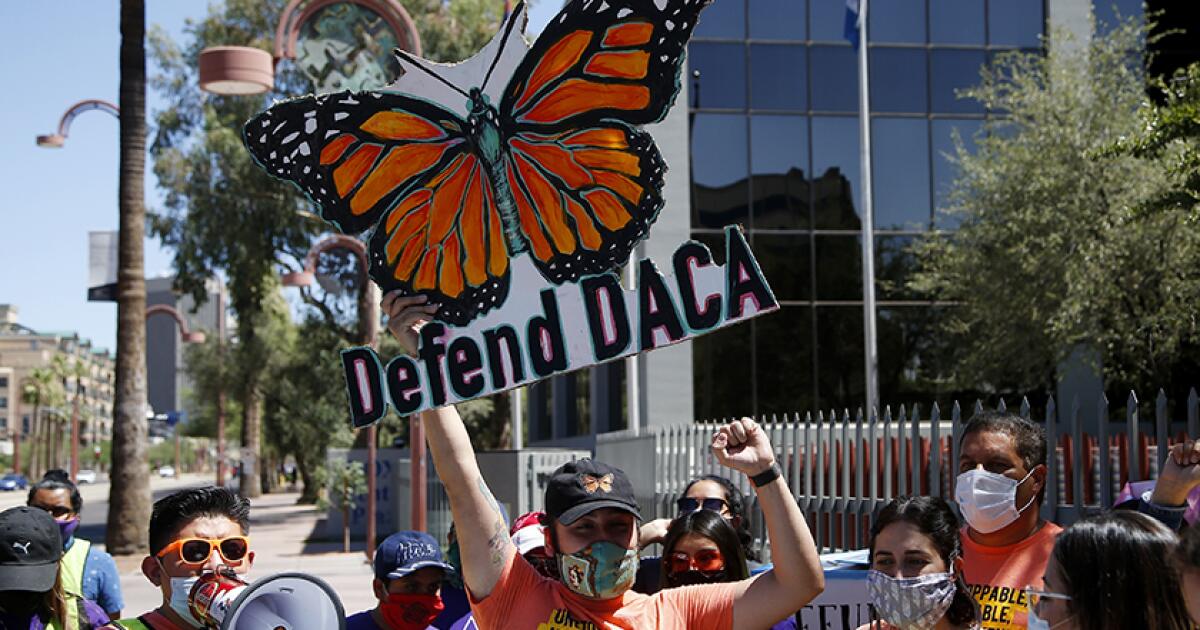U.S. will consider new applications for DACA for the first time in years
WASHINGTON — For the first time in four years, the federal government plans to begin processing initial applications for DACA, the Obama-era program that grants deportation protection and work permits to immigrants brought to the U.S. as children.
The move, outlined in a proposal Monday by the Justice Department, would reopen DACA to first-time applicants in every state except Texas. The proposal was filed in response to an ongoing lawsuit in U.S. district court in Brownsville, Tex.
According to the filing, Texas residents who already have DACA could continue receiving protection from deportation but would no longer qualify for employment authorization.
Lawsuits over DACA, or Deferred Action for Childhood Arrivals, have been ongoing since President Trump moved to end the program during his first term.
Under the government’s proposal, DACA recipients who move into Texas would risk losing their legal ability to work, while moving out of Texas could allow them to resume qualifying for a two-year work permit.
The proposal is pending a final decision by U.S. District Court Judge Andrew Hanen.
“These proposals do not limit DHS from undertaking any future lawful changes to DACA,” the filing states.
The Department of Homeland Security did not respond to a request for comment.
Juliana Macedo do Nascimento, deputy director of federal advocacy for United We Dream, said misinformation was circulating Tuesday on social media.
“We’ve seen a lot of folks saying initial applications will start right away. That’s not true,” she said. “The status quo stays. If you are a DACA recipient right now, even in Texas, if you can renew you should renew as soon as possible because then you have another two years.”
Other advocacy groups, such as the nonprofit Dreamers2gether, urged DACA recipients and hopeful applicants to leave Texas and file a change of address form with U.S. Citizenship and Immigration Services.
More than 525,000 immigrants are currently enrolled in DACA. Texas follows California in the ranking of states with the highest number of program enrollees, according to USCIS.
To qualify, applicants must prove they came to the U.S. before they turned 16 and have graduated from high school or were honorably discharged from the military. Applicants also cannot have serious criminal records.
But for years the program has sat in a state of uncertainty, stoking anxiety for many recipients, amid court battles that stopped applications from being processed and left many younger people who would have aged into qualifying for DACA instead vulnerable to deportation.
In this first term, Trump attempted to shut down the program, but the Supreme Court concluded in 2020 that his administration had acted improperly. The court did not rule on the program’s legality.
Because of the court battle, the program has been closed to new applicants since 2021, though current recipients could still renew their work permits.
Los Angeles resident Atziri Peña, 27, runs a clothing company called Barrio Drive that donates proceeds toward helping DACA recipients renew their applications.
Peña, who also has DACA, said she knows many people in Texas who are thinking about moving out of state. The latest news is another example of how the immigration system breaks families apart, she said.
“A lot of us who are DACA recipients, we don’t necessarily know what it was like to be undocumented before DACA, so most of us have careers that we won’t be able to continue,” Peña said.
United We Dream has recorded at least 19 current DACA recipients detained by immigration agents in recent months. In one case in Texas, immigration authorities have kept Catalina “Xochitl” Santiago detained despite an immigration judge saying she cannot be deported.
“It’s a way of making sure she can’t renew her DACA and then she becomes deportable,” said Macedo do Nascimento. In her view, the Department of Homeland Security’s attitude toward DACA recipients lately has diminished the protections it offers.
“The bigger picture here is DHS is moving onto a new policy on DACA anyway — without having to go through the courts, the rulemaking process or taking DACA away altogether,” she said. “They’re really trying to end the program piece by piece, recipient by recipient.”
Even so, immigrants across the country are looking forward to applying for DACA for the first time.
“While we could still get detained, it’s a little bit of a sense of safety and hope,” Peña said. “I have heard of people who are just waiting for DACA to reopen. But let’s see what happens and let’s hope they don’t use this as a way to catch more of us.”




